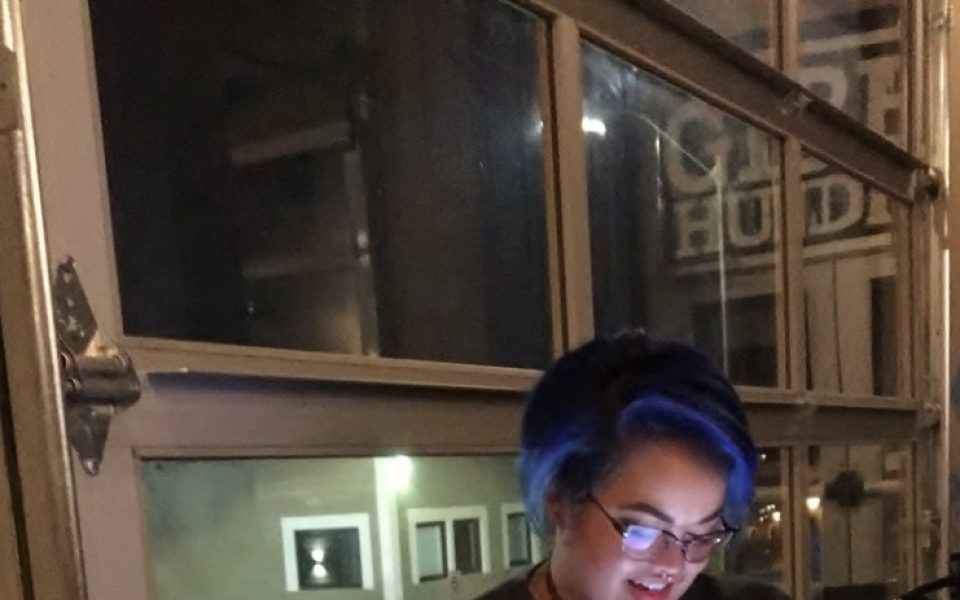A black, three-tiered cart on wheels sits between two wooden tables, brimming with coloring books, markers and paper. A sign hangs on the front, beaconing those curious to fill their cups with their choice of brew and fill a page or two with doodles.
This scene has become routine at Gibb’s Hundred Brewing in Greensboro, where artist Nikita Hatmaker has made a weekly tradition of hosting Drink & Draw every Thursday since August. The non-binary artist, who uses “they/them” pronouns, utilizes these events as a way to gather artists together with no regard to skill level.
Hatmaker balances a position as a data analyst with illustration. As they sat by a large window in the taproom, they dipped a watercolor brush pen into a light blue paint. The aquatic hue bled into most of the square page, leaving out a round shark with a golden outline. The shark’s face held soft features in baby blue and pink, juxtaposing the ferociousness one would expect. The blue-haired craftsperson finds themselves particularly fascinated with glow-in-the-dark and metallic colors. Elements of charm and whimsy fill their art, but Hatmaker grounds their work in practicality.
“I’m really obsessed with efficiency” Hatmaker commented.
When Gibb’s Hundred Brewing invited Hatmaker to host, they took the opportunity to combine a desire to connect other artists and to stay motivated.
Hatmaker explained that Drink & Draw provides a platform for hobbyists, freelancers and those who have never drawn to sharpen skills, and to keep one another inspired. The bespectacled artist finds the taproom turns into a workshop, with people holding up in-progress drawings and asking for feedback.
“You’ve got to start somewhere,” they said, “and you’ve got to be motivating other people too.”
The lack of judgement makes for a crafting free-for-all, as Hatmaker emptied a small pencil bag onto a table near the window. These were Hatmaker’s own supplies, brought to share. Paint pens, ink and pencils get passed around like dishes at a family dinner. The cart itself was stocked by Hatmaker, along with Shelf Life and Reconsidered Goods.
On a regular basis, people from both around and outside of Greensboro will visit, some coming from as far as Raleigh. Hatmaker, head tilted in a mathematical fashion, calculated the average age of visitors to be in their late twenties, but finds interactions between varying ages and skill levels to make the arts entertaining.
“I’ve done trades with kids at shows and that’s really exciting,” Hatmaker smiles.
Hatmaker delights in being able to connect with others during events, and notes that usually children stop by their table at festivals and shows. They recalled a moment where a few children had wanted to trade a $3 drawing of an eyeball for one of Hatmaker’s stickers. Hatmaker believes making memories such as these leave lasting impressions on young artists.
All this comes with a touch of environmentalism from Hatmaker.
“You think about art and you think about how it’s wasteful,” they mused. “I think about that a lot.”
Hatmaker keeps a box of paper pieces and magazine cut-outs labeled “oh scrap,” and collages as a relaxation method. Equipped with this and a trove of printing supplies, Hatmaker prioritizes making items by hand, while keeping supplies cost-effective and local.
The illustrator also highlights digital work, pulling out a tablet and swiping through a gallery of black-and-white portrait pieces with one finger, pausing on a drawing of a girl with fangs. The more realistically rendered figure sat atop of a pillow-covered bed wearing rabbit slippers, making the portrait more playful than menacing. Hatmaker mentions that their current projects include a zine about small, shared moments that takes inspiration from fictional characters and a set of holiday cards.
In Hatmaker’s eyes, the fine arts should remain welcoming of new minds, as the community lacks a cap on how many people or what styles can be included. Drink & Draw allows for a glimpse into the breadth of creative work.
“There’s a market for everyone,” Hatmaker said.
Join the First Amendment Society, a membership that goes directly to funding TCB‘s newsroom.
We believe that reporting can save the world.
The TCB First Amendment Society recognizes the vital role of a free, unfettered press with a bundling of local experiences designed to build community, and unique engagements with our newsroom that will help you understand, and shape, local journalism’s critical role in uplifting the people in our cities.
All revenue goes directly into the newsroom as reporters’ salaries and freelance commissions.


Leave a Reply